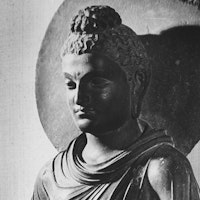For a state that is not pleasant or delightful to me must also be to him; and a state that is not pleasing or delightful to me, how could I inflict that upon another?
Gautama Buddha

Not Pleasing Or Delightful
Topic: Virtue, Morality, & Ethics
The Ariyan disciple thus reflects, Here am I, fond of my life, not wanting to die, fond of pleasure and averse from pain. Suppose someone should rob me of my life… It would not be a thing pleasing and delightful to me. If I, in my turn, should rob of his life one fond of his life, not wanting to die, one fond of pleasure and averse from pain, it would not be a thing pleasing or delightful to him. For a state that is not pleasant or delightful to me must also be to him; and a state that is not pleasing or delightful to me, how could I inflict that upon another?
As a result of such reflection he himself abstains from taking the life of creatures and he encourages others so to abstain, and speaks in praise of so abstaining.
Gautama Buddha, also known as Siddhartha Gautama, was a spiritual teacher and the founder of Buddhism. Born in the 6th century BCE in Lumbini, now modern-day Nepal, he was destined for greatness. At the age of 29, he renounced his luxurious life as a prince and embarked on a spiritual quest to find the ultimate truth about human suffering and the nature of existence.
After years of intense meditation and self-discipline, Gautama attained enlightenment under a Bodhi tree in Bodh Gaya, India, at the age of 35. He became the Buddha, which means "the awakened one" or "the enlightened one." Gautama Buddha spent the rest of his life teaching the Four Noble Truths and the Eightfold Path, which formed the core principles of Buddhism. His teachings emphasized the importance of overcoming desire and attachment to achieve liberation from suffering. Known for his compassion and wisdom, Gautama Buddha's teachings have had a profound impact on millions of people worldwide, inspiring them to seek inner peace and spiritual enlightenment. His legacy as a spiritual leader and philosopher continues to resonate and guide individuals on their spiritual journeys to this day.
Samyutta Nikaya
Wilson, Andrew, editor. World Scripture - a Comparative Anthology of Sacred Texts. Paragon House, 1991, p. 115 [Samyutta Nikaya 5.353].

Gautama Buddha
Theme: Golden Rule
Resources
Copyright © 2017 – 2025 LuminaryQuotes.com About Us

Samyutta Nikaya 5.353
The passage gives a similar reflection about abstaining from other types of immoral behavior: theft, adultery, etc. To identify oneself with others is also a corollary to the Mahayana insight that all reality is interdependent and mutually related.
–Andrew Wilson Ph. D., editor [World Scripture: A Comparative Anthology of Sacred Texts, preface by Ninian Smart].
The Golden Rule Chronology
c. 563-483 BC Buddha in India teaches compassion and shunning unhealthy desires. His golden rule says: “There is nothing dearer to man than himself; therefore, as it is the same thing that is dear to you and to others, hurt not others with what pains yourself” (Dhammapada, Northern Canon, 5:18).
–Rev., Dr. Harry Gensler S.J. [The Golden Rule Chronology].